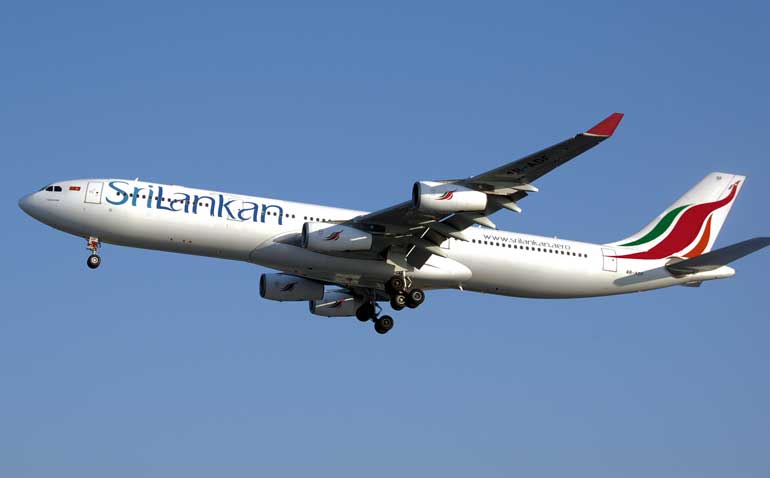Sunday Feb 22, 2026
Sunday Feb 22, 2026
Saturday, 7 May 2016 00:00 - - {{hitsCtrl.values.hits}}

SriLankan Airlines yesterday announced it has recorded a significantly improved performance at the close of the Financial Year ending 31 March 2016 (based on un-audited financials) compared to the previous year – despite several legacy issues still remaining unresolved.
Given the complexity of the business, these issues are being addressed in a responsible manner together with the shareholder as part of the restructuring programme of the airline.
Without ‘one-off’ extraordinary payments related to restructuring activities, the airline’s Group loss stood at Rs. 8.9 billion – a 46% improvement for the current period compared to the previous year.
While the steep drop in fuel prices contributed to the airline’s improved performance, this benefit was significantly eroded with its revenue declining 4% year on year to Rs. 115.9 billion in 2015/16 from Rs. 120.4 billion in 2014/15.
Addition of capacity to the Colombo market by other airlines, accompanied by a dramatic drop in airfares in certain markets largely contributed to the declining revenues. The performance was further impacted by the depreciation in the exchange rate compared to the previous year.
As at 31 March 2016, the National Carrier’s debt stood at Rs. 64.92 billion against the previous year of Rs. 56.92 billion. A capital infusion of $ 150 million (for SriLankan and Mihin Lanka) in the National Budget presented to the Parliament in November 2014, and approved, was not included in the Interim Budget presented in March 2015.
The National Budget presented in November 2015 did not contain it either. The finance charges of the airline stood at Rs. 5.6 billion, for the current year an increase of16% from last year. Due to the non-receipt of the capital infusion of $ 125 million, additional bank borrowing had to be taken which resulted in an additional interest charge for the financial year of Rs. 1.73 billion.
Notwithstanding these challenges, the airline has been able to make significant savings in controllable cost items which have also contributed to the improved performance. This has been due to increased focus on and scrutiny of costs across all areas.
The airline’s staff have come forward to make constructive suggestions towards cost saving initiatives and also worked hard at negotiating cost reductions with vendors. Given market realities, revenue enhancements are going to be challenging. Therefore the airline will continue to work on costs, streamlining processes and improving productivity without which the airline cannot achieve financial self- sufficiency.
The Restructuring Plan which was approved by the Cabinet last year recognised that, for a sustainable future, the airline needed to address certain fundamental problems. Re-structuring the fleet and addressing the issue of the A350-900 aircraft which had been ordered by the previous management was a priority. These aircraft are both inappropriate and too expensive for the airline, given the current operating environment and the excessive lease costs.
The airline is exploring all options in this regard and hopes to continue with the acquisition of more narrow body aircraft, while delaying or otherwise changing the future wide body aircraft already committed. These negotiations are now at an advanced stage and the airline has been continuously interacting with the shareholder on this matter.
The Restructuring Plan also recognised that significant route rationalisation was required given the recent unprecedented shift in the marketplace. However, the airline took a measured and phased approach towards route rationalisation, to ensure that any decisions would not have a negative impact on the tourism industry. Therefore all changes are taking place in a phased manner with adequate notice being given to both the travel trade and our customers.
At the same time, given the magnitude of the inherited adverse financial situation, the Ministry of Finance and the Ministry of Public Enterprises have reviewed the funding requirements for the immediate future. The Ministry has advised the airline that within the next six months it intends to re-structure the financials (including the outstanding debt) of the airline.
The shareholder has also indicated that it is exploring the option of a Public-Private Partnership (PPP) for the company and has appointed a Special Committee to provide direction on the broader expectations of the GoSL. The airline will be working closely with the Committee, and under its guidance implementing certain steps necessary to prepare for a possible PPP. The airline expects that in this process, a clear path to a sustainable, long-term future which would be in the interest of all the stakeholders, will be identified and implemented within the next six months.
Reuters: Sri Lanka’s junior finance minister has asked President Maithripala Sirisene to stop officials flying business class as part of government efforts to reduce the country’s ballooning budget deficit.
Lakshman Yapa Abhayawardene also asked Sirisena to direct ministers and government officials to monitor the financial management of all ministries.
“I expect your personal and dedicated intervention to implement a strong fiscal management system,” Abhayawardene wrote in a letter to the president.
The request comes as the government takes steps to raise revenue by 100 billion rupees in 2016, in response to repeated requests from the IMF, by increasing value added tax (VAT).
Sri Lanka is heavily indebted, partly due to borrowing by the previous government during its nine-year tenure that ended in January 2015, and faces a balance of payments crisis with around $2 billion foreign outflows from government securities.
The government last week reached an agreement with IMF for a $1.5 billion bailout to help Sri Lanka avert a balance of payments crisis.